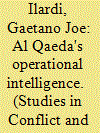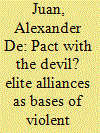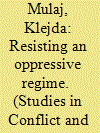| Srl | Item |
| 1 |
ID:
084998


|
|
|
|
|
| Publication |
2008.
|
| Summary/Abstract |
For Al Qaeda, intelligence is a critical operational resource. Its vigorous collection, scrutiny, and dissemination within the organization have proven fundamental to its capacity to engage in carefully crafted acts of terrorism. In addition to its operational utility, intelligence fulfills a range of other functions, including an ability to contribute to Al Qaeda's symbolic goals and elevate the confidence of operatives and leadership alike. Ultimately, however, Al Qaeda's collection and use of detailed intelligence reveals a capacity to calculate the consequences of alternative courses of action, thereby helping to dispel notions of an irrationality or fanaticism in which decision making is somehow removed from reality.
|
|
|
|
|
|
|
|
|
|
|
|
|
|
|
|
| 2 |
ID:
085000


|
|
|
|
|
| Publication |
2008.
|
| Summary/Abstract |
This article aims at explaining religious conflicts on the basis of an elite-centered theoretical model. Violent movements can only pertain on the long run if political elites organize and coordinate them centrally. The same holds true for the religious dimension of many conflicts. Religious elites have to persuade the believers of the religious nature of their struggle. Hence, in many cases religious conflicts can be traced back to alliances of religious and political elites. The first try to protect their religious communities and hope to expand their religious influence. The latter try to use religion as a resource for mobilization
|
|
|
|
|
|
|
|
|
|
|
|
|
|
|
|
| 3 |
ID:
084999


|
|
|
|
|
| Publication |
2008.
|
| Summary/Abstract |
Although no war faction escapes controversy, it is often said that the Kosovo Liberation Army (KLA) is one of the most successful guerrilla movements in recent history. This article suggests that KLA's success can be attributed to the symbiosis between national and international legitimacy. The guerrilla's mission should be understood in the context of persistent oppression of the Kosovo Albanians by Serbian governments. Whilst failure of peaceful resistance enabled KLA's national legitimation, its tactics and strategy acted as a force multiplier for its recognition and success. KLA's resilience in the face of vicious Serbian suppression of Kosovo Albanians raised international awareness and prompted NATO's support, an act that contributed to guerrillas' endorsement at the international level.
|
|
|
|
|
|
|
|
|
|
|
|
|
|
|
|
| 4 |
ID:
084997


|
|
|
|
|
| Publication |
2008.
|
| Summary/Abstract |
This article will apply what shall be termed a "strategic hub" concept of counterinsurgency to the war in Iraq. This concept posits that the development of insurgent and militia nodes or "hubs" of activity could provide a more relevant way to address the key dilemmas of the Iraq equation in light of the Coalition and Iraq government's inability to secure Iraq. The article will argue that ceding the insurgency and militias ground on a temporary basis may be required to maintain both military and political momentum in the post "surge" Iraq given the draw down of U.S. forces, the immaturity of the Iraqi Security Forces, and the present state of American and Iraqi politics.
|
|
|
|
|
|
|
|
|
|
|
|
|
|
|
|